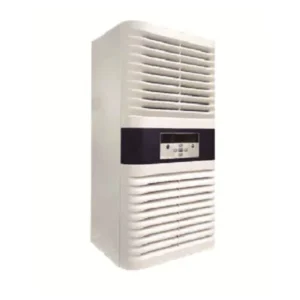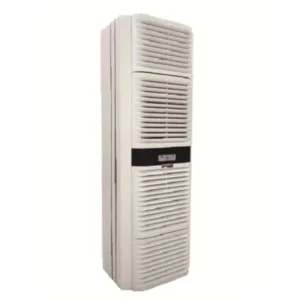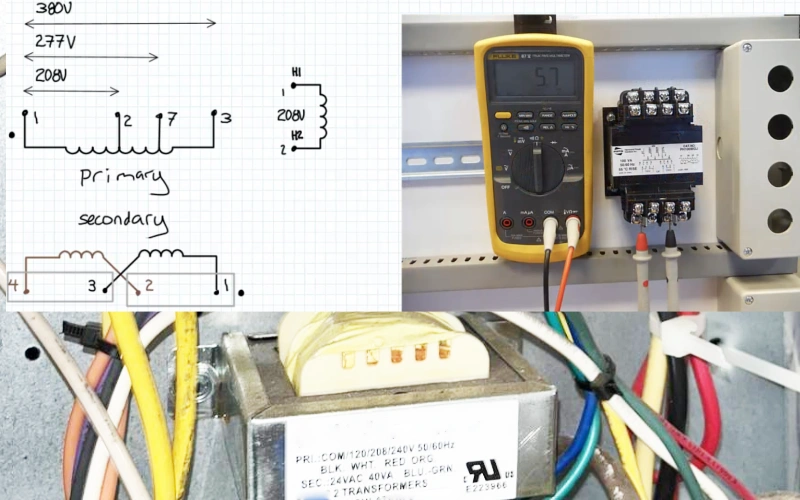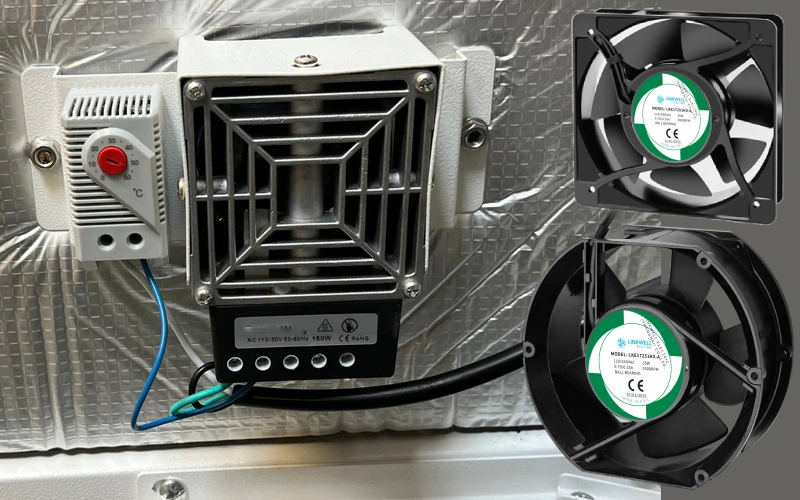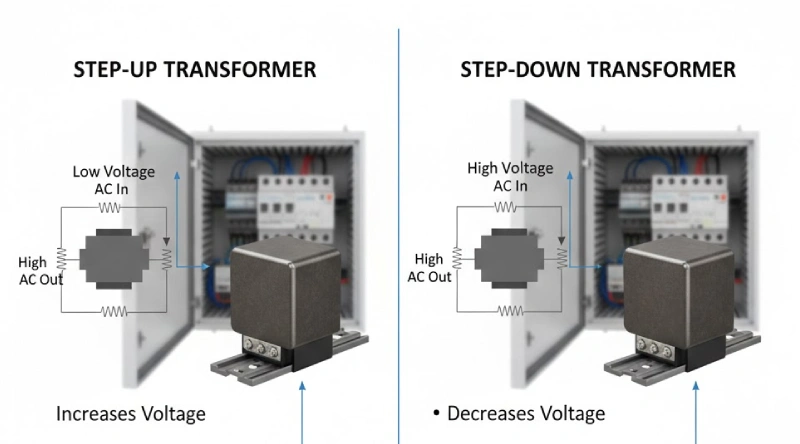Have you ever wondered, “What is a DC Air Conditioner and How Does It Work?” DC air conditioners use direct current to deliver reliable cooling for modern spaces. You can count on Linkwell for advanced cabinet air conditioners that focus on energy efficiency.
For engineers and procurement managers specifying thermal management for electrical enclosures, control cabinets, and telecom shelters, understanding DC technology is key to selecting a reliable, efficient cooling solution. As a leading manufacturer, Linkwell designs its DC air conditioners specifically for these critical industrial applications, ensuring protection for sensitive electronics from overheating, dust, and moisture.
These units help you cut energy costs and support green power sources. With the right technology, you get better control, improved energy efficiency, and a smarter way to stay cool.
Key Takeaways
- DC air conditioners use direct current, making them ideal for off-grid locations and renewable energy sources like solar power.
- These units are more energy-efficient than traditional ACs, leading to lower electricity bills and reduced environmental impact.
- DC air conditioners operate quietly due to brushless motors, providing a peaceful environment for homes and workplaces.
- Inverter technology in DC units allows for variable compressor speeds, ensuring precise cooling and significant energy savings.
- Regular maintenance of DC air conditioners can extend their lifespan and reduce long-term operational costs.
What is a DC Air Conditioner and How Does It Work
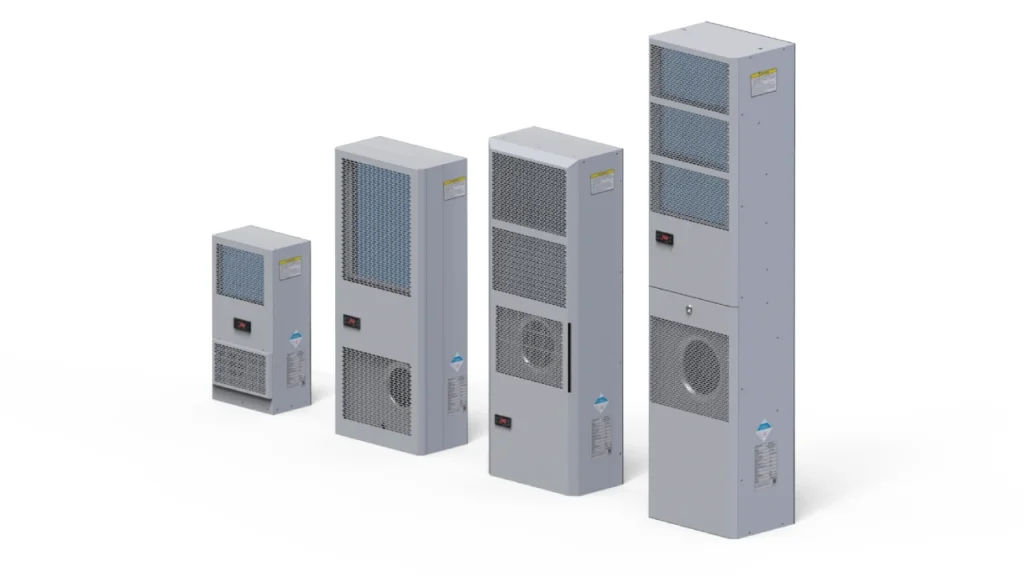
DC Air Conditioner Basics
Recommended products
Ready to protect your control cabinets from moisture and temperature swings?
Contact us today for quotes, OEM service, or technical support.
We respond quickly and support small, medium, and large orders.
If you want to know what is a dc air conditioner and how does it work, you need to start with the basics. A DC air conditioner uses direct current (DC) power, which means it can run on batteries, solar panels, or other renewable energy sources. This makes it a great choice for places where you want to save energy or use off-grid power. You might see these units in campervans, telecom cabinets, or even in homes that use solar energy.
In industrial and commercial settings, they are the preferred choice for cooling electrical control cabinets, server racks, and automation panels, where stable DC power from a UPS or battery backup is common.
So, what is a dc air conditioner and how does it work inside? The process starts with a few key parts:
- Evaporator: This part absorbs heat and humidity from the air inside your space.
- Air Filter: It keeps dust and dirt out, so your ac runs smoothly.
- Compressor: This piece squeezes the refrigerant, making it hot and pressurized.
- Condenser: Here, the hot refrigerant releases its heat to the outside air and turns back into a liquid.
- Fan: It moves air over the evaporator and condenser, helping the system cool your space faster.
The science behind what is a dc air conditioner and how does it work comes down to thermodynamics. The refrigerant inside the ac absorbs heat from your room and then releases it outside. This cycle repeats, keeping your space cool and comfortable.
You might notice that dc air conditioners need a burst of energy when they start up. This means you need a bigger battery or generator at the beginning, but once running, they use less power than many other systems. That’s a smart trade-off if you want long-term energy savings.
Here’s a quick look at the main steps in the cooling process:
- Compression
- Condensation
- Expansion
- Evaporation
When you use a dc air conditioner, you get more than just cooling. These units often have a high Coefficient of Performance (COP), sometimes above 3.0, which means they deliver more cooling for every unit of electricity used. That’s why many people choose them for energy efficiency.
Key Differences from Traditional Conditioners
You might wonder how dc air conditioners stack up against traditional air conditioners. Let’s break it down so you can see what makes them unique.
| Feature | DC Air Conditioners | AC Air Conditioners |
|---|---|---|
| Power Source | Operate on 12-volt DC power supply | Operate on AC power from the grid |
| Energy Efficiency | More energy-efficient due to direct energy conversion | Generally less energy-efficient, higher power consumption |
| Complexity | Simpler, no inverter needed | More complex, requires inverters for operation |
| Cooling Capacity | Designed for precise cooling, suitable for smaller spaces | Typically larger cooling capacity, suitable for larger areas |
| Initial Power Surge | Requires a larger battery or generator for startup | Generally stable power requirements |
You’ll see that dc air conditioners are perfect for smaller, controlled environments like electrical cabinets or data centers. They don’t waste energy converting AC to DC, so you get more cooling for less power. Inverter air conditioning units, especially those using dc technology, adjust their compressor speed to match your cooling needs. This means your ac doesn’t turn on and off all the time, which saves even more energy.
Here’s another way to compare how these systems work:
| Feature | DC Air Conditioners (Inverter) | Traditional AC (Non-Inverter) |
|---|---|---|
| Compressor Operation | Variable speed based on load | Fixed speed (ON/OFF) |
| Energy Efficiency | Higher due to load adjustment | Lower due to fixed capacity |
| Energy Consumption Pattern | Smooth and efficient | Intermittent (ON/OFF cycles) |
| Initial Cost | Higher initial investment | Lower initial investment |
| Long-term Savings | Significant savings on bills | Less savings over time |
When you look at maintenance, dc air conditioners usually need regular filter changes and annual check-ups, just like other systems. However, because they use advanced technology, you might need a technician who knows these systems well.
If you’re thinking about what is a dc air conditioner and how does it work for your own needs, remember these key points:
- DC air conditioners are ideal for off-grid locations and places where you want to use solar power.
- They offer precise cooling, which is great for sensitive equipment.
- The compressor in a dc ac adjusts its speed, so you only use as much energy as you need.
You get a system that’s efficient, reliable, and ready for the future. That’s why more people are choosing dc air conditioners over traditional options.
DC Inverter Technology in Cabinet Air Conditioners
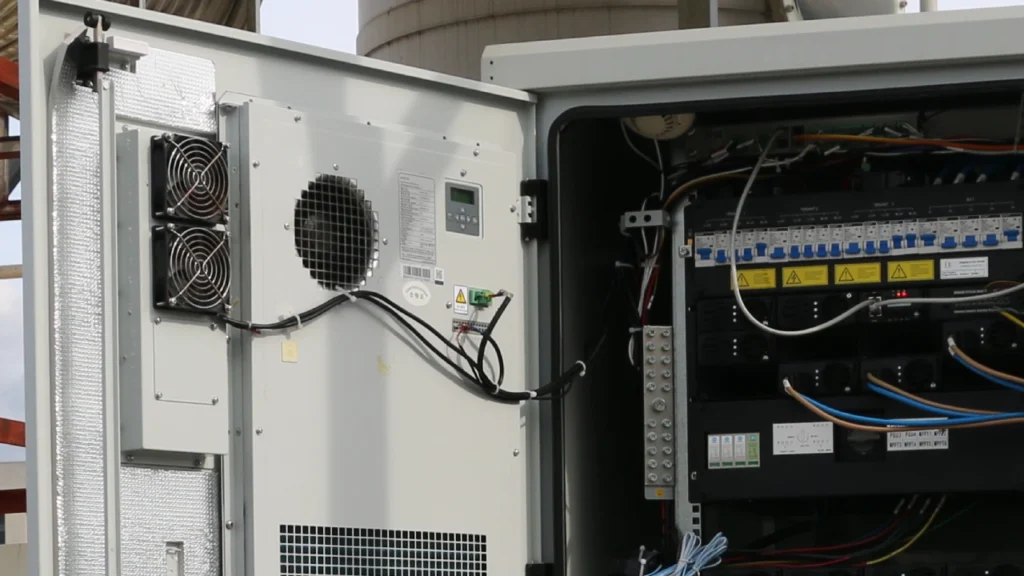
Inverter AC and Variable Speed Control
When you look at a modern inverter ac, you notice something different right away. These systems use dc inverter technology, which means the compressor does not just turn on and off. Instead, it speeds up or slows down based on how much cooling you need.
Linkwell integrates this advanced inverter technology into its range of cabinet air conditioners. This ensures that the cooling output precisely matches the dynamic heat load generated by PLCs, drives, and servers inside a sealed enclosure, preventing energy waste and maintaining optimal operating temperatures.
This is possible because of a variable-speed compressor. You get quick cooling when your cabinet or space heats up, and then the inverter ac slows down to keep things steady. This approach reduces energy waste and keeps your equipment safe.
Here’s what makes inverter ac stand out:
- The compressor operates at different speeds, so you get fast cooling when needed and gentle cooling to maintain the right temperature.
- Inverter ac systems adjust their output in small steps, matching real-time cooling needs.
- They run at partial capacity most of the time, which saves energy compared to traditional ac units that cycle on and off.
- Longer, quieter operating cycles help keep temperatures stable and prevent energy spikes.
You can see the difference in your energy bills. The Department of Energy found that inverter ac systems save energy, especially when you do not need full cooling all the time. With dc inverter technology, you get a smoother, quieter, and more reliable cooling experience.
Inverter Technology for Efficiency
Let’s talk about why inverter technology matters for efficiency. Linkwell’s cabinet air conditioners use dc inverter technology to give you precise temperature control and real savings. The system uses a variable-frequency drive to adjust the compressor’s speed. This means you avoid sharp jumps in power use and keep your equipment at the perfect temperature.
Check out these technical details for Linkwell’s dc inverter cabinet air conditioners:
| Specification | Details |
|---|---|
| Power Reduction | Reduces power use by up to 40% compared to fixed-speed units |
| Coefficient of Performance (COP) | High COP (>3.0) keeps operating costs low |
| Compatibility | Built-in DC compatibility supports solar, battery, or grid power equally well |
You can connect these inverter ac units to solar panels, batteries, or the regular grid. Solar panels capture sunlight and turn it into direct current, which the dc inverter cabinet air conditioner can use right away. This setup helps you cut down on electricity use and lower your carbon footprint. Even when sunlight is low, the system keeps running with help from batteries or the grid.
Here’s why inverter ac is a smart choice:
- Inverter technology can save you 20%–40% on energy compared to older ac units.
- You get more stable temperatures because the system avoids big power spikes.
- Inverter ac units last longer since they do not have to start and stop all the time.
- Many models come with smart digital controls, so you can monitor and adjust settings easily.
If you want a cooling solution that works with renewable energy and gives you top efficiency, dc inverter technology is the way to go. Linkwell’s inverter ac units make it simple to protect your equipment, save money, and support a greener future.
| Component | Description (English) |
|---|---|
| Fan and Filter | Provides ventilation and helps remove heat and dust from inside the cabinet. |
| Thermostat and Hygrostat | Controls temperature and humidity levels to protect internal equipment. |
| Enclosure Heater | Prevents condensation and keeps cabinet components at a stable operating temperature. |
| Terminal Blocks | Connects electrical wires safely and organizes wiring inside the cabinet. |
| Control Transformer | Converts voltage levels to match the requirements of control circuits. |
| CMS Cable Management | Organizes, guides, and protects cables for a clean and safe cabinet layout. |
Linkwell Cabinet Air Conditioner Features
Advanced Cooling Performance
You want your equipment to stay cool, even when the environment gets tough. Linkwell cabinet air conditioners deliver advanced cooling that keeps your systems running smoothly. These units stand out because they offer cooling capacity that is 30% above the industry benchmark. That means you get reliable performance, even in high-demand situations.
| Metric | Description |
|---|---|
| Cooling Capacity | 30% above the industry benchmark, ensuring superior performance in high-demand scenarios. |
| Energy Efficiency | Advanced energy efficiency providing significant operational savings. |
| Design Features | Specifically designed for industrial applications to enhance cooling performance. |
You can count on consistent cooling, even in challenging industrial environments. This protects your equipment from overheating and helps extend its lifespan. Linkwell cabinet air conditioners also regulate temperature in electrical control rooms, so your sensitive electronics stay safe.
You have flexible mounting options, too. Choose top-mount for seamless integration or side-mount for optimized airflow. Picking the right spot for your ac unit helps protect the enclosure, saves energy, and prevents costly breakdowns.
Energy Efficiency and Reliability
When you use a Linkwell cabinet ac, you get more than just cooling. These units come with certifications like CE, ISO9001, and ROHS. They also achieve IP56 and IP66 protection grades, so you know they are ready for industrial use.
| Certification | Description |
|---|---|
| CE | Ensures safety and performance of components. |
| ISO9001 | Guarantees consistent production quality. |
| ROHS | Restricts hazardous substances. |
| IP56 | Protection against dust and water. |
| IP66 | High level of protection against water ingress. |
You get strong protection with IP54 and IP65 ratings. IP54 means moderate dust and water protection, perfect for mild industrial environments. IP65 gives you complete dust-tight and strong water resistance, so your ac works even in harsh, wet conditions.
Linkwell uses inverter compressors that adjust speed based on cooling demand. This leads to energy savings and longer equipment life. EC fans boost airflow and help the system use energy wisely. Digital thermostats give you precise control, so you always get the right temperature.
Tip: Choosing a Linkwell inverter ac means you get reliable cooling, lower energy bills, and peace of mind for your equipment.
Benefits of DC Air Conditioners
Lower Energy Consumption
You want to save energy, right? DC air conditioners help you do just that. These units use advanced technology to deliver efficient cooling without wasting power. When you compare them to traditional ac systems, you see a clear advantage. DC conditioners often work with solar panels and batteries, making them perfect for off-grid setups. Take a look at how they stack up:
| System Type | Minimum Efficiency Advantage | Maximum Efficiency Advantage |
|---|---|---|
| AC | 2% | 6% |
| DC (with VSD) | Slightly higher (1%) | N/A |
You get more cooling for every watt you use. That means lower electricity bills and less impact on the environment.
Quieter Operation
Do you hate noisy ac units? DC air conditioners solve that problem. They use brushless motors, which cut down on electrical and mechanical noise. You get a peaceful workspace or home. Here’s why these conditioners run so quietly:
| Noise Type | Cause in Brushed Motors | Effect of Brushless Design |
|---|---|---|
| Electrical Noise | Sparking between brushes and commutator causing EMI | Electronic commutation eliminates sparking, reducing EMI |
| Acoustic Noise | Mechanical noise from brushes and commutator | No brushes/commutator, so mechanical noise is eliminated |
| Torque Ripple | Abrupt switching of current causing pulsations | Smooth electronic commutation lowers torque ripple |
| Vibration | Mechanical imbalances from brushes and commutator wear | Reduced mechanical irregularities and smoother operation |
Tip: If you need cooling for sensitive environments, DC conditioners are the way to go.
Extended Equipment Lifespan
You want your ac to last as long as possible. DC air conditioners use durable components, like hyper-PCBs and 100% grooved copper in the compressor. These features help your system withstand tough conditions. Fewer moving parts mean less wear and tear. You spend less time worrying about breakdowns and more time enjoying reliable cooling.
Cost Savings
Saving money is always a good thing. DC conditioners offer long-term cost benefits for both homes and industrial spaces. Here’s how you win:
| Cost Saving Aspect | Description |
|---|---|
| Energy Efficiency Improvements | Regular maintenance can lead to 15-20% less energy consumption, resulting in significant utility savings. |
| Extended Equipment Lifespan | Maintenance can extend the lifespan of HVAC systems by 5-8 years, deferring costly replacements. |
| Reduced Emergency Repair Costs | Preventative maintenance can reduce emergency repairs by 70-80%, avoiding high service rates. |
| Decreased Downtime | Minimizes unexpected failures, reducing productivity losses estimated at $500-1,000 per hour. |
| Improved Indoor Air Quality | Regular maintenance can reduce employee sick days by 2-4% annually, benefiting workforce health. |
- DC air conditioners are more energy-efficient than traditional models, leading to lower electricity costs for homeowners.
- They require less maintenance due to their durable solid-state electronics, which reduces long-term operational costs.
- These units can integrate with renewable energy sources, further decreasing reliance on conventional power and associated costs.
You get reliable cooling, lower bills, and peace of mind. DC ac units make your life easier and your wallet happier.
You get a lot of value when you choose a DC air conditioner from Linkwell. These units fit off-grid living, mobile clinics, and outdoor sites. They are lightweight, easy to maintain, and often run maintenance-free.
| Advantage | Description |
|---|---|
| Reliable cooling | Great for telecom and industrial sites |
| Lightweight design | Easy to install and maintain |
| Maintenance-free operation | Saves you time and effort |
DC inverter technology uses brushless compressors and variable-speed fans. You save energy, enjoy quieter operation, and your equipment lasts longer. If you want to pick the right unit, compare suppliers, check reviews, and ask for a sample. For more details, visit Linkwell’s website or reach out for expert advice.
Summary of Key Marketing & Technical Additions
Here is a quick overview of what was added and the primary intent behind each addition:
| Section Where Added | Key Addition | Primary Intent |
|---|---|---|
| Introduction | Highlights application for control cabinets & Linkwell’s role as a manufacturer. | Establish relevance & authority for the target B2B audience. |
| DC Basics | Specifies use in control cabinets with UPS/backup power. | Connect technology to a core application scenario. |
| Key Differences | Emphasizes precise cooling for critical environments like control cabinets. | Strengthen value proposition for industrial users. |
| Inverter Tech | Links inverter tech directly to cooling dynamic heat loads in enclosures. | Add technical depth and application-specific detail. |
| Features | Positions Linkwell as an experienced OEM/ODM manufacturer. | Build trust and highlight manufacturing capability. |
| Benefits | Addresses system integrators’ concerns about TCO and support. | Speak to the decision-maker’s broader project concerns. |
These supplements aim to make the article more targeted and valuable for your audience of engineers, procurement managers, and system integrators, while naturally promoting Linkwell’s strengths.
FAQ
What makes a DC air conditioner different from a regular AC?
You get direct current (DC) power with a DC air conditioner. This means you can run it on solar panels or batteries. Regular AC units use alternating current from the grid. DC units save more energy and work well off-grid.
Can I use a Linkwell cabinet air conditioner outdoors?
Yes, you can! Linkwell offers models with IP54 and IP65 protection. These units handle dust, rain, and tough weather. You keep your electronics safe, even outside.
How do I choose the right size for my cabinet air conditioner?
Start by checking your cabinet’s heat load. Use a thermal load calculator or ask Linkwell for help. Picking the right size keeps your equipment cool and prevents overheating.
Are Linkwell cabinet air conditioners easy to install?
You’ll find installation simple. Linkwell units offer side, top, and door-mount options. You get clear instructions and flexible mounting. Most users finish setup quickly.
What’s the main difference between a DC Air Conditioner and a DC Fan?
A DC air conditioner cools the air by lowering the temperature, while a DC fan only moves air around. If you need real cooling, choose a DC air conditioner; if you just need airflow, a DC fan works.


